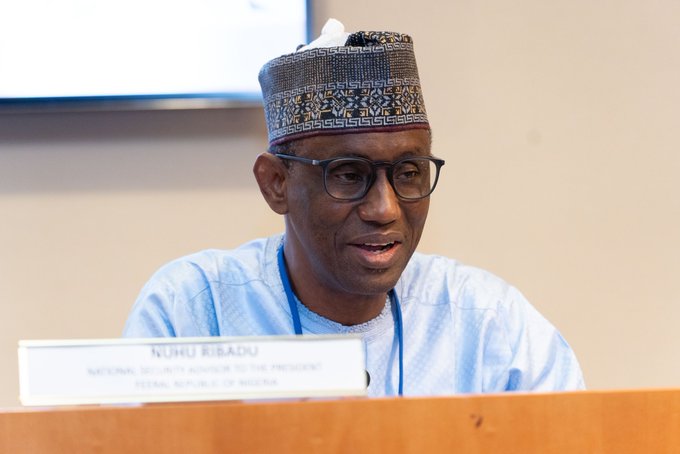In a scathing rebuttal to recent allegations, Nigeria’s National Security Adviser, Nuhu Ribadu, has dismissed claims made by the head of state in Niger Republic, General Abdourahamane Tiani, that the Nigerian government is collaborating with France to establish a military base in northern Nigeria. Ribadu vehemently rejected the accusations, calling them “baseless” and “unfounded,” while stressing that Nigeria has no intention of hosting foreign military forces on its soil.
Speaking during a BBC Hausa interview, Ribadu expressed his shock and disbelief over Tiani’s claims, which surfaced amid rising tensions in the region following the coup in Niger. The allegations have stoked fears of foreign military intervention in West Africa’s already volatile security landscape. However, Ribadu was clear in his statement: “Nigeria has never had any agenda to permit foreign countries to come into our territory and set up military bases,” he asserted, emphasizing that Nigeria’s national security strategy is based on peaceful cooperation with its neighbors.
Tiani’s remarks, made public in a recent interview, suggested that France was plotting to establish a military base in Nigeria’s Sokoto State to monitor Niger, Chad, and other neighboring countries. This claim, which quickly gained traction in some circles, was dismissed by Ribadu as a mere fabrication. “Where did this come from?” Ribadu questioned. “How could anyone claim that Nigeria would allow a foreign country to establish a military base here to cause havoc or instability for the people of Niger?”
Ribadu’s response highlights Nigeria’s long-standing stance on foreign military presence. He pointed out that despite past overtures, Nigeria has consistently refused to allow foreign powers to establish military bases within its borders. “The British, who colonized Nigeria, never attempted to bring their military into the country,” Ribadu said, further noting that even the United States, which sought to set up a military base in Nigeria in the past, was denied permission. After Nigeria’s refusal, the U.S. turned to Niger, only for the Nigerien government to later expel American forces, a decision Ribadu described as a “realization of their mistake.”
This latest controversy comes at a time when tensions between France and the Niger junta have escalated. Following Niger’s recent coup, the French government has faced accusations of meddling in the region, particularly regarding its military presence in several former colonies. The Niger junta’s allegations of French military involvement have fueled concerns about potential instability in West Africa, a region already grappling with security threats from terrorist groups, including Boko Haram and ISIS affiliates.
Ribadu, however, sought to reassure both Niger and the international community of Nigeria’s position. “We coexist peacefully with Cameroon, Chad, and Benin Republic,” he stated. “How, then, can someone claim we are having problems with the Niger Republic?” He emphasized that Nigeria is committed to regional stability and that any suggestion of destabilizing its neighbors is entirely unfounded. Ribadu also urged a focus on constructive dialogue and collaboration rather than inflammatory accusations that could undermine the region’s peace.
The National Security Adviser also addressed Tiani’s assertion that France was financing Nigeria’s government to establish a military presence in the north for a potential invasion of Niger. Ribadu dismissed this as “ludicrous,” explaining that Nigeria’s policy on foreign military presence is rooted in sovereignty and the desire to avoid involvement in external conflicts. He made it clear that Nigeria has never agreed to any arrangement with France to launch military operations in the region. “We would never do such a thing,” he asserted firmly.
Ribadu’s comments also extended to the broader security challenges faced by Nigeria and its neighbors. While Niger’s leadership continues to confront internal instability, Ribadu reminded the Nigerien government of the shared responsibility in combating terrorism. He noted that both Nigeria and Niger face common threats from groups like Boko Haram and other insurgents, which continue to destabilize the region. “The real issue is terrorism,” Ribadu said. “We need to unite and fight these terrorists together.”
Ribadu urged Niger’s leadership to reconsider its stance, warning that relying on external powers for security might create long-term problems. He pointed to Niger’s earlier decision to allow an American military base, a choice that was later regretted. He called for renewed cooperation between Nigeria and Niger, especially in the joint task force combating Boko Haram. “Niger must understand that anything that happens in Nigeria will inevitably affect them as well,” Ribadu stressed. “We are one big family, and any injury to one will inevitably affect the others.”
Furthermore, Ribadu echoed calls for a return to the collaborative security framework established with Chad and other regional powers. The withdrawal of Niger from the joint efforts against Boko Haram, he argued, has weakened the region’s collective security and increased vulnerability to terrorist threats. “Niger must rejoin the fight,” Ribadu urged. “The fight against terrorism is a collective effort. Let us work together.”
In closing, Ribadu reinforced Nigeria’s commitment to peace and regional security. He called on Niger’s leaders to avoid the temptation of inviting foreign military powers, emphasizing that such a path could lead to unforeseen consequences. “Any nation that comes as a friend today might become a problem for them tomorrow,” Ribadu warned, urging Niger to rely on its neighbors for support rather than external forces.

